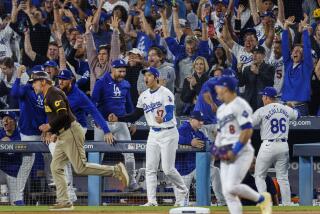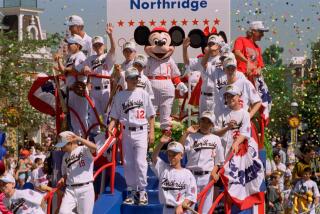Swimming With the Barracuda
LONG BEACH — Chris Gibbs, owner of the Long Beach Barracuda baseball team, stood outside the locker room at Blair Field, deep into a difficult conversation with a player. This was Thursday afternoon, minutes before a game with the Bend Bandits. Gibbs is a huge man--6-foot-7, 350 pounds--and on one of the summer’s hottest days he was dressed in a long-sleeved shirt. Maybe that’s why sweat ran down his boyish face.
The player spoke only Spanish, so Gibbs had drafted a bilingual member of the minor league squad to interpret. “Tell him,” Gibbs was saying, “I’ll write him a check. Tell him I personally will go with him to the bank. I’ll cash it for him on the spot.” The interpreter passed all this along. The ballplayer did not look satisfied. He scowled, turned his head and then, in a universal baseball gesture, he spat.
If Gibbs noticed, the 33-year-old owner managed not to show it. This is his first year in professional baseball, and he’s learning. That’s one thing about losing hundreds of thousands of dollars, missing a payday or two, fighting off an attempted palace coup and a hostile takeover bid by Heather Locklear, watching the crowds shrink, filing for bankruptcy. Stuff like that, it makes you tough.
*
Gibbs describes himself as “an entrepreneur who made a miscalculation.” He figured it was a sure thing when he and a few investors decided to bring an independent minor league baseball team to Long Beach. This is a city on a losing streak when it comes to municipal attractions. “Long Beach,” Gibbs declared at the outset, “has got a lot of straightforward people who want a fair shake.” They would flock to a team of their own.
Now, the theme from “Field of Dreams” bounced through the light-blue bleachers of the pretty park. The recorded music seemed to mock Gibbs. He had built it but, on this day anyway, they had not come. He blamed a late rescheduling. American Legion teen-agers needed the field that night, forcing his team to hastily organize what Gibbs called a “businessman’s special.” His use of the singular wasn’t far off the mark.
“Fifty-five,” a Barracuda chirped from the dugout at Gibbs, who stood alone in his box seat. The player had just made a comic show of counting the house, one by one. “You’ve got 55 here today, boss.”
Gibbs threw a ball at the player. He missed.
Cynics, Gibbs said, they’re everywhere. They question the announced attendance counts, which on average run about 1,500 a game. (“Today’s paid attendance,” another Barracuda, mimicking the P.A. announcer, sang out as the game began, “one thousand, five hundred and fifty-five.”) In the newspaper, they run pictures of a kid sucker-punching the mascot, Barry Barracuda, or try to turn the tossing of a ‘Cuda fan--for excessive heckling of the home team--into the next Watergate or something. Negative stuff.
“For most people,” Gibbs said, “the glass is always half empty. Well, even if there’s only a few drops in the glass, at least it’s not empty.”
*
There are, no doubt, conflicting accounts of what went wrong. In Gibbs’ telling, he blew about $350,000 trying to develop Barracuda radio broadcasts. This led to missed paydays; even Barry the Barracuda complained: “That’s not how I like to do business,” the mascot huffed through his fish suit. The front office staff quit en masse. Two aides attempted a takeover, recruiting Locklear and other investors. And so on.
Gibbs had laid out his version in short, halting sentences, spoken in the flat, vacant voice of the shellshocked: “Sports is very powerful and makes people do crazy things. . . . I still believe in people I guess. . . . Most athletes are first-class, but it’s like anything. . . . Adversity’s part of the game. . . . Anyway, life’s too short, why focus on the half-empty glass?”
So far, Gibbs has hung on, cutting back, restructuring. Everyone, he promised, will be paid in full, eventually. “It’s been fun ,” he insisted. See that man down there, he said, pointing. He brings his son to every game. And watch how these ballplayers hustle, playing for peanuts to keep dreams alive. And look at the scoreboard: The home team ahead 3-2 after seven. “This,” he said with confidence, “is our sixth win in a row.”
Well now, that premature counting of a victory was another mistake, for of course the team from Bend came back and snatched the game in the ninth. It’s been that kind of year. The crowd filed out; it did not take long. And for a moment, Gibbs sat alone in the grandstands, silent, reflective-- a portrait of a man counting drops in a glass.
More to Read
Go beyond the scoreboard
Get the latest on L.A.'s teams in the daily Sports Report newsletter.
You may occasionally receive promotional content from the Los Angeles Times.











